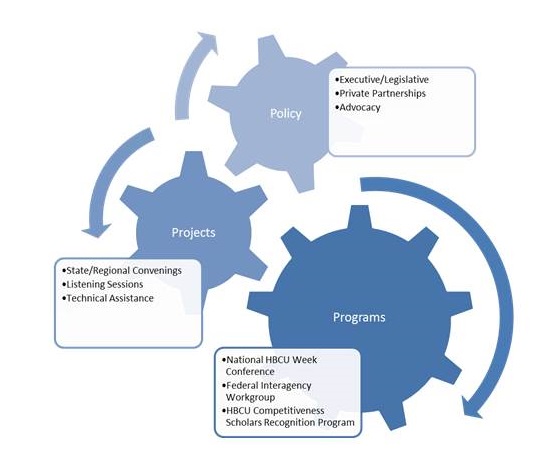White House gov
AFRICAN PROGRAM EDUCATION REFORM
The history of the African Education.Program Reform Education.
The Education reform is the name given to the goal of changing public education.
Historically, reforms have taken different forms because the
motivations of reformers have differed. However, since the 1980s,
education reform has been focused on changing the existing system from
one focused on inputs to one focused on outputs (i.e., student
achievement). In the United States, education reform acknowledges and
encourages public education as the primary source of K-12 education for
American youth.Education reformers desire to make public education
into a market (in the form of an input-output system), where
accountability creates high-stakes from curriculum standards tied to
standardized tests.[1][2] As a result of this input-output system,
equality has been conceptualized as an end point, which is often
evidenced by an achievement gap among diverse populations.[3] This
conceptualization of education reform is based on the market-logic of
competition. As a consequence, competition creates inequality which has
continued to drive the market-logic of equality at an end point by
reproduce the achievement gap among diverse youth.[clarify]
The one constant for all forms of education reform includes the idea
that small changes in education will have large social returns in
citizen health, wealth and well-being. For example, a stated motivation
has been to reduce cost to students and society. From ancient times
until the 1800s, one goal was to reduce the expense of a classical education.
Ideally, classical education is undertaken with a highly educated
full-time (extremely expensive) personal tutor. Historically, this was
available only to the most wealthy. Encyclopedias, public libraries and grammar schools
are examples of innovations intended to lower the cost of a classical
education.Related reforms attempted to develop similar classical results
by
concentrating on "why", and "which" questions neglected by classical
education. Abstract, introspective answers to these questions can
theoretically compress large numbers of facts into relatively few
principles. This path was taken by some Transcendentalist educators, such as Amos Bronson Alcott. In the early modern age, Victorian schools
were reformed to teach commercially useful topics, such as modern
languages and mathematics, rather than classical subjects, such as Latin and Greek.Many reformers focused on reforming society by reforming
education on more scientific, humanistic, pragmatic or democratic
principles. John Dewey and Anton Makarenko are prominent examples of such reformers. Some reformers incorporated several motivations, e.g. Maria Montessori,
who both "educated for peace" (a social goal), and to "meet the needs
of the child" (A humanistic goal). In historic Prussia, an important
motivation for the invention of Kindergarten
was to foster national unity by teaching a national language while
children were young enough that learning a language was easy. Proponents
of evidence-based education call for the use of evidence in guiding education reform.Reform has taken many forms and directions.Throughout history
and the present day, the meaning and methods of education have changed
through debates over what content or experiences result in an educated
individual or an educated society. Changes may be implemented by
individual educators or by broad-based school organization and/or by
curriculum changes with performance evaluations.
Mission
The
Initiative shall work with agencies, private-sector employers,
educational associations, philanthropic organizations, and other
partners to increase the capacity and competitiveness of HBCUs to
provide the highest-quality education to an increasing number of
students.The Initiative is dedicated to helping HBCUs successfully
compete for top opportunities in national and global markets while
providing education and economic experiences that can improve the
standards of living for the students and communities HBCUs primarily
serve.
3 Primary Areas of Focus

The Initiative’s work is organized into 3 primary areas of focus:
Programs
are embedded, ongoing and longer-term activities singularly owned by
the Initiative that are generally singularly delivered by the
Initiative, but can be collaboratively delivered with others.
Projects
are finite-duration, discretionary actions, often outside the
Initiative’s, federal agencies’ or private sector actors’ day-to-day
organizational activities; they are designed to accelerate the desired
performance in a targeted area. These short-term efforts are generally
jointly owned and delivered by the Initiative with others and act as
boosters to accelerate HBCU competitiveness.
Policies
are influential actors’ written or oral expressions of important public
objectives and priorities. These actors can be public sector (e.g.,
local, state and federal executive/ legislative/agency) or private
sector (e.g., industry/philanthropy/education/advocacy).
The
FDIC's Money Smart financial education program can help people of all
ages enhance their financial skills and create positive banking
relationships. Learn here about Money Smart tools and strategies that
you can use to teach others, as well as tools you can use to learn on
your own. First released in 2001 and regularly updated since then, Money
Smart has a long track record of success.
The
White House Initiative on Educational Excellence for Hispanics
(Initiative) has compiled Federal sites that have educational resources
for students and educators.The Initiative and the U.S. Department of
Education (ED) does not mandate or prescribe particular curricula or
lesson plans. This site contains links to learning resources created and
maintained by other public and private organizations. This information
is provided for the visitor’s convenience and is included here as an
example of the many resources that educators may find helpful and use at
their option. The Initiative and ED does not control or guarantee the
accuracy, relevance, timeliness, or completeness of this outside
information. Further, the inclusion of links to items does not reflect
their importance, nor is it intended to endorse any views expressed, or
materials provided. The resources are sorted through subject areas.
More information for supports Education in Africa Continent
https://www.madagascar-foundation.org/?gclid=EAIaIQobChMIh6eGlq6Q7AIVEuntCh3CnAjoEAAYAiAAEgLLHfD_BwE

When you have other Questions please you need Contact at:
E-Mail : usafrica_gov@yahoo.com
Phone: +26134026111 or Call toll-free at 1-844-USA-GOV 1( 1-844-827-4681)
Twitter : https://twitter.com/USAfricaGov


